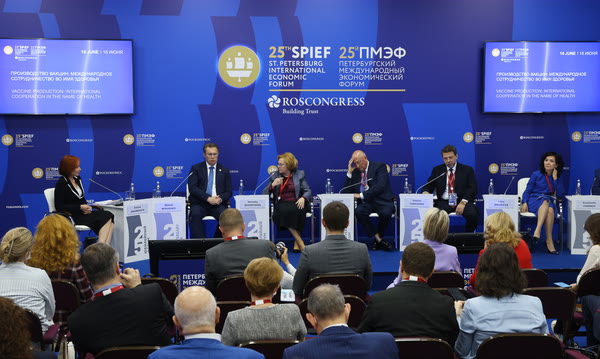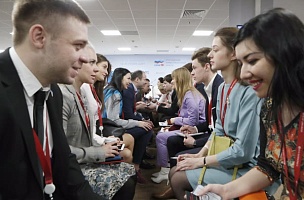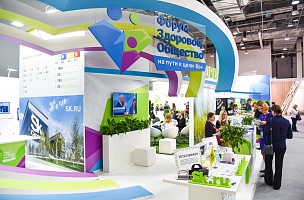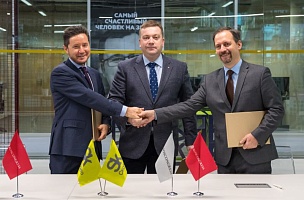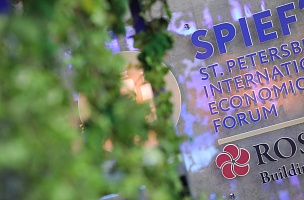Key conclusions
Countries are on the same track in terms of developing effective infection prevention
“Several major things happened during the pandemic. First of all, the biosecurity law. <…> It is among the fundamental things in the Russian Federation, and several countries have adopted the similar regulation at the same time. It shows that the paths are roughly the same for all of us – that is one thing. Secondly, the draft law that we developed some time ago was studied by many countries and taken as a basis. We can see a certain consistency,” Mikhail Murashko, Minister of Health of the Russian Federation.
“The Sputnik V vaccine, registered for use in more than 70 countries, is a proof that Russia does not only have extensive experience in vaccine development, but also has the ability to bring its goods into production, into the pandemic response processes. More than 500 million people worldwide and more than 90 million in the Russian Federation have benefited from this vaccine,” Hans Henri P. Kluge, Regional Director for Europe, World Health Organization.
PROBLEMS
Vaccine developers have to adapt to new conditions, emergency situations, and act quickly
“There is a group within the World Health Organization that is working today to develop and prepare for new challenges. This is a key activity in [our, – Ed.] country among others. <...> One important block within the strategy has been approved. This strategy includes a shield with the following key elements: identification, the development of test systems and the formation of new vaccines within 100 days,” Mikhail Murashko, Minister of Health of the Russian Federation.
“It is very important to have technological platforms, so that at any moment <...> global cooperation allows us all to communicate and to exchange information and technology. Sometimes, something urgent comes up in your country, in our country, and you have to be as prepared and self-sufficient as possible in order to resist and save your own population along with all the diplomatic efforts,” Veronika Skvortsova, Head, Federal Medical-Biological Agency of the Russian Federation.
“One of the lessons of the pandemic we have been living with for the last 2.5 years is that you have to have a few universal technologies that allow you [to act, – Ed.] quickly. <...> Vaccines that have been developed for decades now need to be created within a few months,” Aleksandr Gintsburg, Director, “National Research Center for Epidemiology and Microbiology named after the honorary academician N.F. Gamaleya” of the Ministry of Health of the Russian Federation.
Global pharmaceutical inequality
“My colleagues have asked me to raise the issue of the so-called vaccine inequality again. I am referring to our partners from various public institutions, the Caribbean countries. Countries like Benin, Côte d'Ivoire, Morocco, Serbia, Armenia and others. Many of them say that in certain known economic conditions, first of all, there is no possibility of getting vaccines. Secondly, they recall that a number of countries have been on a vaccine purchasing waiting list. Thirdly, they express considerable surprise that not all vaccines have received international recognition by the World Health Organization or other institutions, though they were recognized in national jurisdictions. I am talking about Russian vaccines, of course,” Lydia Mikheeva, Secretary, Civic Chamber of the Russian Federation; Chairman of the Board, Research Centre of Private Law under the President of the Russian Federation.
“If we are building our own epidemic safety system, which will be less dependent on imports or will not depend on foreign intervention at all, we must understand the cost of this system. For a domestic product that is produced in the amount of, say, 10–20 million doses, it cannot be cheaper than a similar product produced abroad by pharmaceutical tycoons in the amount of 200–300–500 million doses. <...> We want at least a return on investment in the foreseeable future,” Konstantin Chernov, Director of Development, Chumakov Federal Scientific Center for Research and Development of Immune and Biological Products of the Russian Academy of Sciences.
SOLUTIONS
Healthcare system should stay away from politics
“There are two areas for development. The first is prequalification of a medicine, and the second is prequalification or approval of a medication’s clinical or preventive efficacy. These are two pathways that the World Health Organization has not yet taken. But, in my opinion, they are worthy of attention,” Mikhail Murashko, Minister of Health of the Russian Federation.
“We must adjust the global health architecture to make it truly multilateral, leaving no country behind. Health must stay away of politics. Governments must invest more resources in the health system and in human resources, in digitalization, and in emergency preparedness and response,” Hans Henri P. Kluge, Regional Director for Europe, World Health Organization.
“We are ready to set up a small workshop at one of the Federal Medical and Biological Agency's strategic facilities to create substances and active agents. And then, with the help of the Ministry of Health and the Ministry of Industry and Trade, we can simply hand them over to those who can replicate them further and, with the help of excipients, bring them to the finished products,” Veronika Skvortsova, Head, Federal Medical-Biological Agency of the Russian Federation.
For more information, visit the Roscongress Foundation’s Information and Analytical System at roscongress.org.


